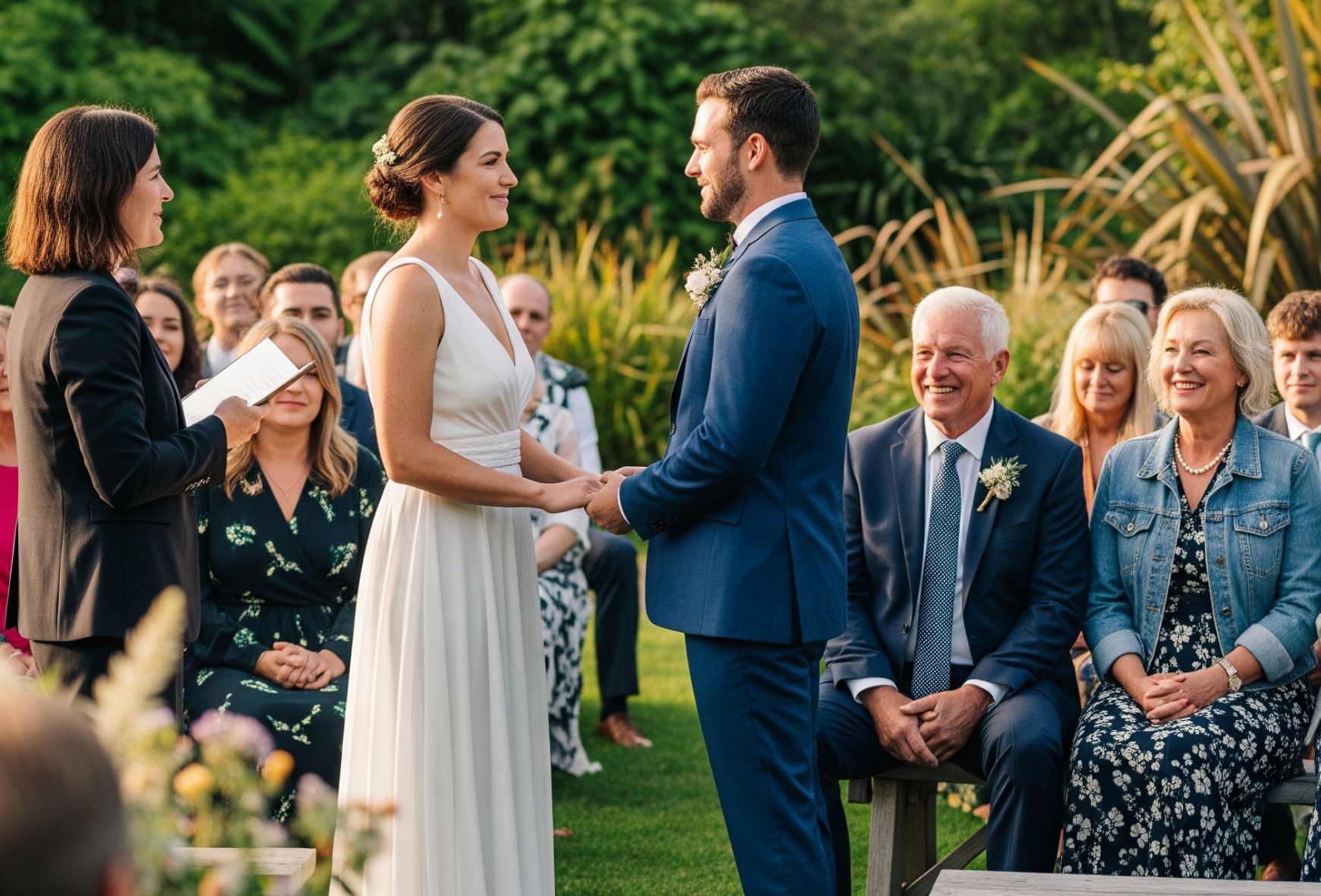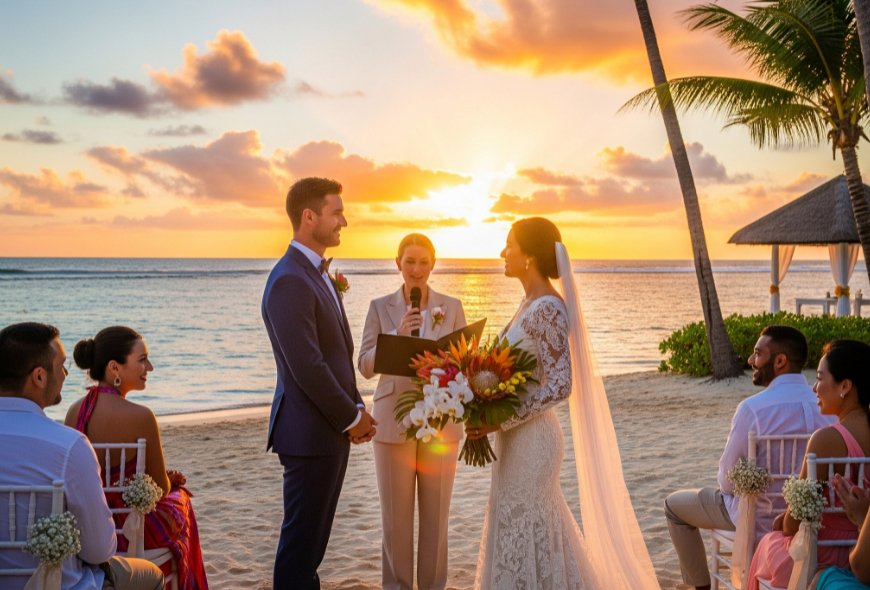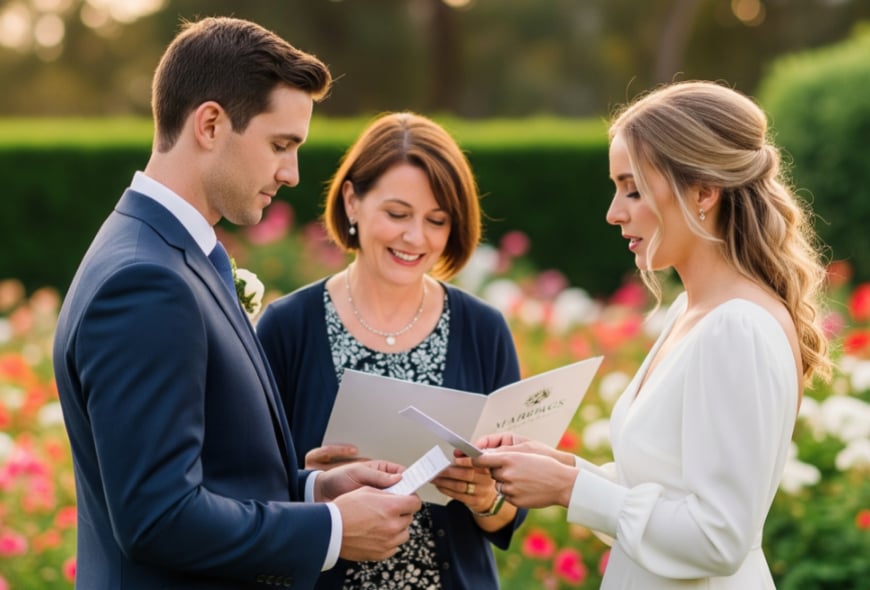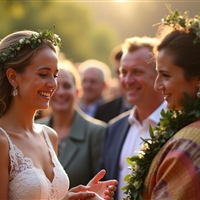
Planning your wedding ceremony timing can feel like walking a tightrope between creating meaningful moments and keeping your guests comfortable. Whether you're dreaming of an intimate 15-minute exchange of vows or envisioning a grand 45-minute celebration, working closely with your celebrant is essential to crafting the perfect ceremony length for your special day.
Understanding Standard Ceremony Lengths
Most New Zealand wedding ceremonies typically run between 20 to 35 minutes, though this can vary significantly based on your personal preferences and cultural traditions. A basic civil ceremony might clock in at around 15-20 minutes, whilst more elaborate celebrations with personalised vows, unity ceremonies, and multiple readings can extend to 45 minutes or longer.
Your celebrant will be instrumental in helping you understand what elements contribute to ceremony length and how to balance your vision with practical considerations. Remember, there's no "perfect" length – only what feels right for you as a couple.
Factors That Influence Ceremony Duration
Guest Comfort and Venue Considerations
Consider your guests' comfort when planning ceremony length. Outdoor ceremonies in New Zealand's variable weather conditions may benefit from shorter durations, particularly during winter months or if rain threatens. If guests will be standing throughout the ceremony, aim for the shorter end of the spectrum.
Venue restrictions can also impact timing. Some locations have strict time slots or noise restrictions that may influence your ceremony's duration. Your celebrant will help you navigate these practical considerations whilst ensuring your ceremony remains meaningful.
Cultural and Religious Elements
Incorporating cultural traditions, blessings, or religious elements will naturally extend your ceremony. Māori blessings, handfasting ceremonies, sand ceremonies, or religious readings each add precious minutes to your celebration. Discuss with your celebrant how to weave these elements seamlessly into your ceremony flow.
Personal Touches and Customisation
Personalised vows, special music, family involvement, and unique rituals all contribute to ceremony length. Whilst these elements make your ceremony distinctively yours, each addition should be considered thoughtfully with your celebrant's guidance.
Working Collaboratively With Your Celebrant
Initial Planning Discussions
During your first meetings, be honest about your vision and timing preferences. Share any non-negotiables – perhaps you've always dreamed of a particular reading, or you absolutely must include a family tradition. Your celebrant can then structure the ceremony to accommodate these elements whilst maintaining good pacing.
Discuss your guests' demographics too. A ceremony filled with elderly relatives or young children might benefit from a more concise format, whilst a gathering of close friends might happily embrace a longer, more elaborate celebration.
Creating a Detailed Timeline
Work with your celebrant to create a minute-by-minute breakdown of your ceremony. This should include:
- Processional and seating (3-5 minutes)
- Opening remarks and welcome (2-3 minutes)
- Readings or musical interludes (3-5 minutes each)
- Vow exchange (5-8 minutes)
- Ring exchange (2-3 minutes)
- Any unity ceremonies or special rituals (3-7 minutes)
- Pronouncement and kiss (1-2 minutes)
- Recessional (2-3 minutes)
Your celebrant will help you identify which elements are essential and which might be trimmed if needed.
Rehearsal Refinements
The ceremony rehearsal is your opportunity to test timing in real conditions. Your celebrant will guide you through the entire ceremony, noting any sections that feel rushed or drawn out. This is the perfect time to make final adjustments and ensure everyone feels comfortable with the pacing.
Tips for Perfect Ceremony Timing
Keep Vows Concise Yet Meaningful
If you're writing personal vows, aim for 1-2 minutes each. Your celebrant can provide guidance on structure and length, ensuring your words are heartfelt without testing your guests' attention spans. Consider writing longer, more detailed vows to share privately and keeping ceremony vows more concise.
Plan for the Unexpected
Build small buffers into your timeline for emotional moments, unexpected weather, or technical difficulties. Your celebrant will have experience managing these situations and can subtly adjust pacing as needed.
Consider Your Photography Needs
Coordinate with your photographer and celebrant to ensure important moments aren't rushed. Some couples prefer longer pauses during ring exchanges or the kiss to allow for perfect photographs, whilst others prefer a more natural flow.
Managing Guest Expectations
Communicate With Your Wedding Party
Ensure your wedding party understands the ceremony's expected length and flow. Your celebrant can brief them during the rehearsal about their roles and timing, preventing any awkward pauses or rushed moments.
Weather Contingency Plans
For outdoor ceremonies, work with your celebrant to prepare shortened versions of your ceremony in case of inclement weather. Having a "rain plan" that maintains all your essential elements whilst reducing overall time can save the day.
The Final Touches
Remember that your ceremony length should reflect your personalities and relationship. Some couples thrive with intimate, brief exchanges, whilst others want to savour every moment with elaborate celebrations. Trust your celebrant's experience in helping you find the perfect balance.
Your celebrant brings invaluable experience about what works well and what doesn't. They've seen countless ceremonies and understand how to maintain energy, manage emotions, and create memorable moments within whatever timeframe you choose.
The goal isn't to achieve a specific duration but to create a ceremony that feels authentic, engaging, and perfectly timed for your unique celebration. With thoughtful planning and open communication with your celebrant, you'll craft a ceremony that honours your love story whilst keeping your guests engaged from the first word to the final kiss.
Working collaboratively with your celebrant ensures your ceremony timing feels natural and purposeful, creating a beautiful beginning to your married life that you and your guests will treasure forever.


